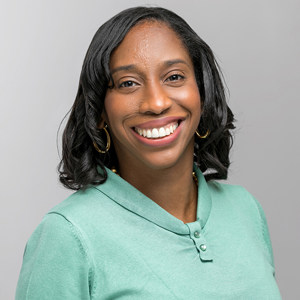 Dilly Severin, Senior Director, Global Initiatives, FP2020
Dilly Severin, Senior Director, Global Initiatives, FP2020
Working as a Black woman in international development is complicated. Working in family planning is even more complicated—because what is more politicized than sex? And whose bodies have been more politicized, sexualized and traumatized than those of Black and Brown women? It’s no wonder then, that these women have led the movement to reframe our understanding of health, wealth, and development and have rejected power dynamics that would trivialize, dehumanize — silo — us. Transitioning the FP2020 Secretariat into the partnership beyond 2020 requires breaking down those silos. In so many ways, building the next phase of the partnership with a focus on equity, justice, and intersectionality, not only challenges us to rethink what it means to protect and uphold the rights of people trying to access family planning, but it is also fundamentally a mandate to make our interventions whole again when the trappings of development – donor priorities, foreign government policies, religious institutions – have siloed them.
I have been thinking a lot about that concept of wholeness lately.
An integrated and intersectional approach to family planning can only come from radically rethinking our partnerships — the power of them, the power within them, and who is a part of them. At a moment when the world is grappling with racial injustice and what it means to realize diversity, equity, and inclusion, even as a pandemic casts into sharp relief the structural inequities among us, this work of transforming partnerships is not just necessary, it is an imperative.
Over the last eight years, FP2020 has achieved important progress on family planning — and has always done so in partnership. Since 2012, more than 130 commitment makers have come together to ensure 53 million additional women and girls are now able to use modern contraception; to prevent 119 million unintended pregnancies and avert 21 million unsafe abortions and 134,000 maternal deaths. Equally significant has been the creation of a global rights-based family planning agenda, the recognition of and support for the critical role of civil society in driving accountability, and our collective responsibility to ensure the meaningful engagement of adolescents and youth.
We have also learned important lessons about where a partnership that has already yielded so much can be further strengthened. Perhaps the most important of all is that without a country-driven partnership and commitment-making model grounded in mutual accountability, and not donor priorities, our impact will be limited. If we do not match the fulfillment of the right-based family planning with an equal fervor for achieving outcomes that are equitable and just, we will not be responding to the complex realities of women, girls, and other vulnerable communities. We certainly will not achieve the universal health coverage mandate of leaving no one behind. The 2030 partnership is therefore an opportunity to build on the successes of the past and to chart a new way forward that articulates our continued contribution to the fulfillment of sexual and reproductive health and rights — as well as a more just and equitable future.
Luckily, it turns out that radically rethinking power within a partnership is surprisingly similar to rethinking allyship at an individual. Just as allyship is not an end state or an identity, but a commitment to a process of continual learning, ever-increasing accountability, and intentional divestment of harmful power structures, so too should be our conception of a 2030 partnership. We hope to realize that conception through:
- A vision framework that goes beyond the numbers to strengthen the importance of transforming social and gender norms and improving system-responsiveness to individual rights and needs — in addition to continuing to drive data-informed decision making.
- A shift from a secretariat to a regional hub model to reflect the mandate of country-driven and country-owned priorities versus vertical partnerships. The new universal opt-in model, which the FP2020 team will begin releasing more information about as it’s created, also provides the potential to expand the partnership’s impact to a greater subset of countries, foster regional learning, and encourage meaningful national investments to support sustainable family planning progress.
- Building an even bigger pool of commitment makers and partnerships by engaging non-family planning health sector partners and other sectors beyond health. This includes an advocacy mandate that facilitates enhanced global and regional coordination and supports the universal health coverage agenda, drives integration efforts and deepens work with the HIV and maternal health sectors, and with faith-based leaders.
- Making greater investments in national and subnational and social accountability efforts and a commitment-making model that fosters mutual accountability and strengthens the role of civil society, including the meaningful engagement of adolescents and youth.
And this is just a start.
Critically, just as with allyship, the evaluation of the 2030 partnership’s success cannot be based on measures we define for ourselves, but only by those we vow to serve. As we move into the next phase of partnership, we invite you on this journey of learning, adaptation, and transformation of power with us. Together we have already achieved so much. Now, let us work towards a family planning movement that truly makes things whole.
